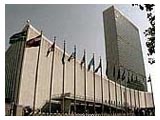|
|
TODAY.AZ / Politics
Armenia rejects UN role in Karabakh talks
04 September 2006 [19:34] - TODAY.AZ

Oskanian and his Azerbaijani counterpart Elmar Mammadyarov are tentatively scheduled to meet in Paris or London next week to discuss ways of kickstarting the Karabakh peace process. Officials in Baku and Yerevan have said the meeting could pave the way for another crucial Armenian-Azerbaijani summit before the end of this year.
"We have not yet confirmed the September 12 meeting," Oskanian told reporters. "I don’t know whether it will take place. It will depend on developments unfolding at other bodies."
He was clearly referring to a joint appeal to the UN which was made last week by Azerbaijan, Georgia, Moldova and Ukraine. The four ex-Soviet states aligned in the pro-Western GUAM grouping reportedly asked the UN General Assembly to discuss the unresolved ethnic conflicts in the South Caucasus and Moldova at its upcoming session. They argued that international efforts to settle those conflicts have yielded no results.
Armenia has always been opposed to UN involvement in Karabakh peace talks, insisting that the Minsk Group of the Organization for Security and Cooperation in Europe remain the main international body brokering a solution to the Armenian-Azerbaijani dispute. It apparently fears that Azerbaijan would enlist the backing of other Muslim nations to push pro-Azerbaijani resolutions through the General Assembly. Speaking to RFE/RL last month, the Armenian ambassador at the UN, Armen Martirosian, warned that Yerevan will pull out of the negotiating process if the Karabakh issue is included on the assembly agenda.
Oskanian did not deny this, saying that the additional "obstacles" created by Azerbaijan would render further negotiations meaningless. Speaking to Armenian state television at the weekend, he accused Baku of toughening its position on the issue and being reluctant to accept the Minsk Group’s most recent peace plan.
The plan, which was disclosed by the group's American, French and Russian co-chairs in June, calls for a gradual settlement of the conflict that would culminate in a referendum on Karabakh's status. The authorities in Yerevan have largely accepted the proposed deal, saying that it upholds the Karabakh Armenians' right to self-determination.
"Today there is no other document on the table," Oskanian said on Monday. "I think [further talks] will center on it."
The Azerbaijani reaction to the proposed settlement has been more ambiguous, with President Ilham Aliev repeatedly stating in recent months that he will never agree to any deal that could legitimize Karabakh's secession from Azerbaijan. Aliev's top foreign policy aide, Novruz Mammadov, accused the mediators last month of ignoring his country's territorial integrity and warned that Baku might turn to the UN.
URL: http://www.today.az/news/politics/29725.html
 Print version
Print version
Connect with us. Get latest news and updates.
See Also
- 11 February 2025 [15:17]
Military personnel awarded for excellence in Winter Exercise-2025 - 11 February 2025 [11:44]
Ruins of an Azerbaijani mosque are being desecrated in Yerevan - 11 February 2025 [11:11]
Azerbaijan rejects Armenian PM's claims, calls out military buildup and territorial ambitions - 11 February 2025 [11:00]
February proves unsuitability of Pashinyan's project - 11 February 2025 [10:00]
SSS arrests Azer Bagirov in Jordan and brings him to Azerbaijan - 10 February 2025 [23:15]
Trial of criminal case against Ruben Vardanyan continues - 10 February 2025 [15:27]
Azerbaijan bans entry of Russian MP over offensive remarks - 10 February 2025 [15:19]
Azerbaijan clears 787 hectares of land from mines in liberated regions - 10 February 2025 [14:44]
Azerbaijan’s fire safety service reviews 2024 successes and prepares for 2025 - 10 February 2025 [14:03]
Some 74 municipal acts annulled for failing to meet legal standards
Most Popular
 Chemical weapons agency chief to meet Syrian officials in Damascus on Saturday, sources say
Chemical weapons agency chief to meet Syrian officials in Damascus on Saturday, sources say
 South Korean tech giant to display Saudi-tailored AI models at LEAP 2025
South Korean tech giant to display Saudi-tailored AI models at LEAP 2025
 Mono-Armenia what tales did Pashinyan tell in Washington
Mono-Armenia what tales did Pashinyan tell in Washington
 Pashinyan signed up for a ChatGPT course
Pashinyan signed up for a ChatGPT course
 Xi says China ready to work with IOC to promote Olympic Movement
Xi says China ready to work with IOC to promote Olympic Movement
 Istanbul boasts 15.7M population, more populous than 131 countries
Istanbul boasts 15.7M population, more populous than 131 countries
 Turkiye’s President Erdo?an approves migration cooperation agreement with Azerbaijan
Turkiye’s President Erdo?an approves migration cooperation agreement with Azerbaijan
